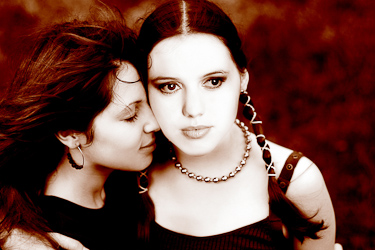I'm not a monster. Or a robot. Or any of the other negatives I'd been labeling myself with for ages in response to some really uncomfortable feelings I'd been having regarding a couple of my relationships. The closer they wanted to be to me, to tell me how into me they are, how special I am to them, the more I wanted to push them away. Far away. Yet, the more another partner kept me at arm's length, the more desperate I felt for their attention and connection, the more I wanted to hear them tell me how into me they are, how special I am to them. What the fuck was going on?
Clashing attachment styles. That's what.
Adult attachment theory has been around since the 80s, but I didn't come across it until a friend recommended I read Attached: The New Science of Adult Attachment and How It Can Help You to Find and Keep Love by Amir Levine and Rachel Heller. Ignoring my discomfort with the lengthy and pop-psychology-bullshit title, I found the book to be extremely enlightening and helped me to see my responses in different relationships to be incredibly normal.
I'll give a very basic summary but I highly recommend reading the book. A few of its biases gave me some discomfort, but overall, I gained much knowledge and relief from its insights.
There are three different attachment styles: Secure, Anxious, and Avoidant. According to the book, Secure attachers “feel comfortable with intimacy and are usually warm and loving; Anxious people crave intimacy, are often preoccupied with their relationships and tend to worry about their partner's ability to love them back; Avoidant people equate intimacy with a loss of independence and constantly try to minimize closeness.”
You can manifest several different attachment styles, depending on the style of the other person in the relationship. Monogamous people usually only need to worry about figuring out one of these but we ethically non-monogamous folks tend to get multiple styles in multiple relationships. Whee! So lucky!
I've discovered that since my spouse of more than 20 years, Flick, is Secure, I'm mostly secure with him. Earlier in our relationship, I was much more anxious and spent the first decade or so we were together thinking every day was the day I would do or say the wrong thing and he'd leave me. Over time that fear lessened and I know through experience that we can survive just about anything, leaving me very secure to disagree and fight with him since I don't fear for our connection. So apparently to get over anxiety, all it takes it ten years! (*sob* If only…)
A long distance love has an Avoidant attachment style. When things have gotten too intense or he feels especially vulnerable, he pulls way back, retreating behind his walls. Unfortunately, my Anxious attachment is activated in response and I tend to reach for him, to seek closeness to re-establish the disrupted connection, which leads to him retreating further in a vicious cycle. I spend a lot of time thinking about our relationship, trying to figure out how to get the connection I need without activating his avoidance. Much of the time we're in a good equilibrium, but when it goes off, it's very challenging for both of us.
With previous partners who were Anxious attachers, thanks to the wonders of brain wiring, I became the avoidant one in response to that kind of attention. I moved toward them when I felt comfortable, but as soon as their attention felt like too soon or too much, I pushed them away. If they sought more closeness than I felt up for, I retreated behind my own walls, shutting them out and trying to establish more boundaries and barriers until they backed away and I felt safe to move forward again.
It's all very complicated and difficult but also incredibly normal, which the book by Levine & Heller helped me understand. Ideally, we'd all be matched with people with compatible attachment styles and that is a good place to start when planning long term partnerships. I'm not a believer that love is the be all and end all in relationships so a truly dysfunctional and miserable relationship that happens to involve love isn't a good one. That said, sometimes, there are many good things about a relationship but you still happen to have conflicting attachment styles. If it's a priority, with some work, you can often figure out how to navigate those issues.
The book has a lot of great information to help you deal with clashing styles. I've found that using my words is an important starting place, especially owning my feelings as mine and not blaming my partner for them or using ‘you make me' or ‘always/never' statements. “I feel overwhelmed by the idea of a weekly scheduled date” is very different than “Your excessive demands on my time make me want to run away.” “I feel abandoned when you don't message me for three days” is different than “You always hide when I express my feelings.” Saying what you feel won't guarantee they won't feel defensive or attacked, but it is the key to clearer communication, and the more you both practice, the easier it gets.
It doesn't mean that it will be smooth or effortless. If you consciously choose to remain in or start a relationship with someone whose attachment style isn't compatible with yours, knowing there will be challenges is essential. I know that being in love with an avoidant person means that I'm sometimes going to want more from him than he's able to give me. I can get schmoopy affection fulfilled in other places so that's a price of admission that I'm willing to pay. And he knows that I'm sometimes going to ask for more than he's up for, and he can say no. Feeling slightly overwhelmed by my attention sometimes is his price of admission in our relationship. I'm not doing anything wrong by asking and he isn't doing anything wrong if he needs to say no to my request.
As someone who treads both sides of the anxious/avoidant line, it helps me to understand what people are feeling, though I often feel like I'm doing a complicated dance trying to keep everything balanced. Trying to get my own needs met while balancing styles isn't easy. Sometimes feelings get hurt, including my own. But understanding attachment and talking things out, rather than hiding from the awkward feelings, helps us work together to figure it out.

